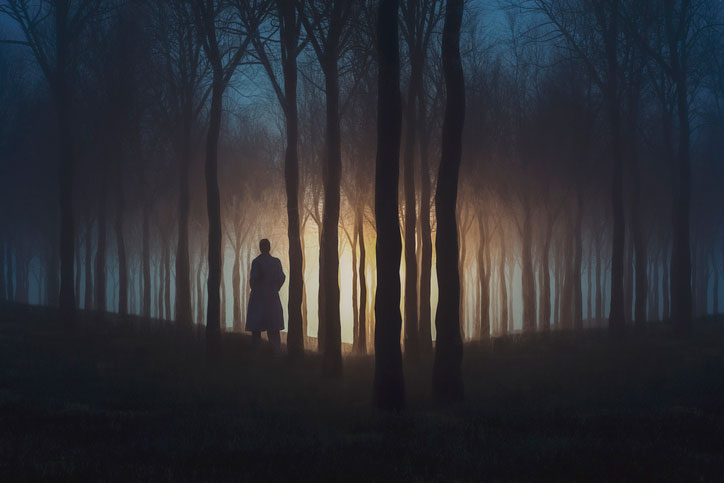Written by Scott Wilson

If you are drawn to a career in mystery writing, you are joining a long and venerable line of some of the most popular English novelists. From Agatha Christie to Gillian Flynn, mystery novelists often develop household names. With a wealth of sub-genres to plumb and legions of readers clamoring for more, it’s also a genre that offers real chances for commercial success.
Despite the subject matter, a good mystery is a cozy, comforting read. Although they frequently involve death and dismay, even the most hard-boiled mysteries wrap chaos in a little bow and leave readers satisfied at the end.
Mystery stories are very formulaic, but that’s exactly what readers want from them. And although there is a formula, it’s not an easy one to follow. Crafting a good mystery tale with the right clues, level of suspense, and clever plotting takes plenty of creativity.
So writers who have a penchant for plot twists and weaving compelling plot lines of important clues, blind alleys, and strange occurrences can still benefit from getting a college education in creative writing.
The History of Mystery Fiction Shows Lasting Popularity for Genre Writers
 The history of mystery fiction is relatively recent and well-documented compared to some other fiction genres. The first widely-recognized mystery story was Edgar Allen Poe’s The Murders in the Rue Morgue, published in 1841. But popularity in the form really rose only in the late 1800s thanks to one enduring fictional detective: Sherlock Holmes, the creation of British physician Sir Arthur Conan Doyle.
The history of mystery fiction is relatively recent and well-documented compared to some other fiction genres. The first widely-recognized mystery story was Edgar Allen Poe’s The Murders in the Rue Morgue, published in 1841. But popularity in the form really rose only in the late 1800s thanks to one enduring fictional detective: Sherlock Holmes, the creation of British physician Sir Arthur Conan Doyle.
Plot twists have existed in literature going as far back as Sophocles’ Oedipus Rex, but it took the introduction of the mystery novel to make them a central part of the reader’s experience.
While it is Holmes’ powers of deduction that linger in the cultural consciousness, it was Doyle’s skills as a writer that put them there. Although he wasn’t the first to invent the characters and methods, he engrained tropes in the genre that remain in the bedrock of mystery writing today:
- A singular, logical detective of extraordinary skill and deductive ability
- Lengthy explanations of the protagonist’s reasoning at the denouement
- A less capable sidekick to whom events must be described through the investigation
Other mystery writers quickly expanded the genre beyond the pure detective novel:
- Agatha Christie quickly mastered the art of providing sufficient clues in her writing to allow readers to play along in solving the mystery
- Dashiell Hammett developed the hard-boiled mystery with gritty realism and flawed investigators
- Erle Stanley Gardner brought the courtroom set-piece to life through his Perry Mason series
- P.D. James and Ed McBain made the process a key part of the attraction of the mystery through the police procedural sub-genre
- Ann Rule turned real-life events into non-fiction mystery novels in her true-crime writing
Those innovations aren’t the end of the story. Creativity continues to propel new niches in mystery.
Mystery Writing Is a Flexible Genre That Overlaps With and Fuels Many Others
Mysteries are often closely associated with thriller and suspense stories, but a pure mystery doesn’t need to involve elements from either of those genres. The appeal and satisfaction that mystery brings to the table is the acquisition of knowledge. Humans are inquisitive by nature; we’re evolutionarily compelled to try to figure things out that don’t make sense. There’s a psychological reward to solving the puzzles that mystery novels present.
Mysteries often involve crimes and criminal investigations, but that’s not a necessary component, either. Supernatural mystery stories involve explanations that veer into the occult. Others, such as the children’s mystery novel Bunnicula (which also manages to stray into both the supernatural and comedy genres), involve mysteries that are inflated by the protagonist but ultimately come to involve benign conclusions.
Hyper-focused Mystery Genres Develop Devoted Readers
 Bunnicula is only part of a popular children’s series of mystery novels that involve a sleuthing cat and dog, but it’s not alone in the astonishing sub-genre of cat-focused mysteries.
Bunnicula is only part of a popular children’s series of mystery novels that involve a sleuthing cat and dog, but it’s not alone in the astonishing sub-genre of cat-focused mysteries.
Cat mysteries, sometimes called kittylit, are a popular kind of cozy mystery novels that keep the more lurid parts of the drama firmly off-stage and bring in adorable, purring feline detectives or detective companions for crime-solving.
Undercover Cat, a novel by Gordon and Mildred Gordon may have been the first such book, popularized by the Disney film adaptation That Darn Cat! But Lilian Jackson Braun’s The Cat Who… series of almost 30 books is probably the best known in the genre.
Like Koko in The Cat Who…, cats in these mysteries sometimes serve as inscrutable characters leading their human associates to important clues. In other cases, they feature felines who serve as anthropomorphized detectives themselves or who can communicate with their human partners in more direct ways.
The fact that Braun could get to almost 30 books in her series gives you some idea how popular these mysteries are, and it’s far from the only such series! It’s just one example of how mystery writers can tap a clear market in sub-genres to build their careers in.
Mystery novels are often quite short, which can make them both easy to read and to write. Readers in the genre are voracious, however. Series are popular in mysteries, bringing well-liked protagonists like Miss Marple or Nancy Drew back again and again.
With a proliferation of sub-genres and crossovers into crime, thriller, and literary fiction, prospective mystery writers have a lot of different options when they sit down to write. An enduring popularity and strong sales record also make mystery one of the types of genre writing that may be most available to build a real writing career out of.
It’s No Mystery How Creative Writing Degrees Help Improve Your Whodunits
 One of the great things about becoming a mystery writer is that no one really checks your credentials. Poe was a failed soldier and journalist; Agatha Christie was a housewife when she first put pen to paper. Your professional or educational credentials may never even show up in your author bio.
One of the great things about becoming a mystery writer is that no one really checks your credentials. Poe was a failed soldier and journalist; Agatha Christie was a housewife when she first put pen to paper. Your professional or educational credentials may never even show up in your author bio.
But writing mysteries isn’t like cranking out fantasy novels where anything goes. You not only need to be able to create plausible and believable scenarios for your mysteries; you also have to be able to tantalize your audience with the possibility of arriving at a solution themselves along the way.
Mysteries are one genre where you will never get away with knowing less than your audience.
A Broad Liberal Arts Background Is Essential to the Mystery Genre
 A mystery novel is one where the characters have to be smarter than the reader. If your twists and turns are too obvious, if the characters aren’t clever enough to unravel the plot before the reader gets there, you’ve got a story that’s going to fall flat.
A mystery novel is one where the characters have to be smarter than the reader. If your twists and turns are too obvious, if the characters aren’t clever enough to unravel the plot before the reader gets there, you’ve got a story that’s going to fall flat.
A college education offers mystery writers a chance to build not just creative writing skills, but also the varied and exotic knowledge that is the stock-in-trade of a mystery plot. Where else will you learn that cyanide tends to smell of almonds, the finer points of double jeopardy in criminal code, or the pathology of Naegeli-Franceschetti-Jadassohn Syndrome, which may conveniently remove the fingerprints of sufferers?
Creative writing programs teach you writing, but also the kind of general knowledge and social depth you need to develop believable, intricate mystery plots.
Wide-ranging Reading Assignments Fuel Style and Plotting for Mystery Writers
Creative writing degrees are famous for the stacks of required reading that come along with them. You’ll be exposed not just to the classics, but also a wide variety of niche and modern writing that illustrates techniques, trends, and styles that you may never have seen before.
Professors use these assignments as starting points for discussions in class, but they also serve to spark your own imagination and dare you to adapt new and interesting approaches in your mystery writing. In a genre that sees thousands of new entries each year, fresh and original writing that still scratches that mystery itch is a big advantage for a new author.
Discipline in Writing and Editing to Power Through Pages
Speaking of those thousands of new entries each year, if you want to be a successful mystery author, you’ll have to learn to produce a few of them on the regular. Mystery novels tend to be shorter than most other genres, 70,000 to 90,000 words, which make them quick reads. That’s what readers are looking for, but it also means that mystery writers need to produce them in some volume to turn it into a profitable venture. The lengthy series that many mystery novelists are known for, with a book or more a year added to the canon, is a testament to this trend.
Creative writing programs push you to write and revise at a high volume through your course of study. This helps build both the kind of technical expertise and the discipline required to become a successful mystery writer.
Building Great Mystery Characters Comes Easily With a Creative Writing Education
 Although mysteries weren’t originally known for their levels of character development, that’s changed in recent years. The fact that so many become long-running series featuring the same protagonists and supporting characters is one factor. After all, from Hercule Poirot to Philip Marlowe, it’s often the central detective in a mystery that keeps readers coming back for more.
Although mysteries weren’t originally known for their levels of character development, that’s changed in recent years. The fact that so many become long-running series featuring the same protagonists and supporting characters is one factor. After all, from Hercule Poirot to Philip Marlowe, it’s often the central detective in a mystery that keeps readers coming back for more.
Newer trends in mystery writing have lead to psychological analysis taking a larger role over the traditional plot-driven mystery, as well. Both these factors can make character building an important skill for the modern mystery writer.
Creative writing programs often feature several classes developed to character-building, giving you a solid sense of the tools and literary techniques needed to bring your detectives and suspects to life for the readers.
Connections and Networking Can Help Lead To Publication
While it’s possible for you to read widely, write prolifically, and study independently of a creative writing program, one thing you can’t duplicate is the connections you will make at school. Writers, like cats, tend not to congregate of their own accord. But that solitary nature leaves them without the advantage of knowing the right people in the right places in the publishing industry.
Creative writing programs feature both experienced faculty who have already been through the publishing rodeo as well as guest lecturers and speakers who are published authors—and who are there to answer questions. You’ll also gain a valuable group of friends and trusted confidants in your fellow students who will offer feedback and support as you all make your way into the world of professional writing. Finally, many colleges have relationships with or even operate their own publishing operations, providing ready-made connections before you even graduate.
Online Creative Writing Studies Let You Get On With Life While Forging a Mystery Writing Career
 Many creative writing programs at all levels today are offered in low-residency or even entirely online formats. It’s a good fit for the kind of work required in these degrees. Most of your assignments will be fairly solitary affairs. Reading through a stack of novels or honing your own short stories or commentary pieces can be done anywhere and anytime the muse finds you.
Many creative writing programs at all levels today are offered in low-residency or even entirely online formats. It’s a good fit for the kind of work required in these degrees. Most of your assignments will be fairly solitary affairs. Reading through a stack of novels or honing your own short stories or commentary pieces can be done anywhere and anytime the muse finds you.
But with online studies, you still get all the benefits of regular interaction with your instructors and fellow students that you would have in the classroom. Online discussion forums are open day and night, and emailing your work in is probably exactly what you would be doing even in more traditional classes.
Most creative writing degrees do require some in-person meetings, but typically only once per semester or even per year. They give you the chance to attend in-person workshops, get the benefit of famous guest lecturers, or just sit around and kick ideas around with your compatriots.
Creative Writing Degrees At Every Level Solve Even The Thorniest Mystery Career Conundrums
 You’ll have to solve the mystery of the best degree level to pursue in creative writing yourself. Fortunately, there are plenty of clues laying around to point you in the right direction.
You’ll have to solve the mystery of the best degree level to pursue in creative writing yourself. Fortunately, there are plenty of clues laying around to point you in the right direction.
For anyone just coming out of high school or who otherwise hasn’t earned a degree yet, an associate’s or bachelor’s degree in creative writing can make a lot of sense. On top of giving you the core skills you need for mystery writing, both those degrees include the kind of essential liberal studies background to qualify for all kinds of entry-level jobs in writing or other fields. Taking between two and four years to earn, they require a significant time commitment, but also have the broadest range of applications.
If you already have a college degree, whether in English or any other field, you might instead choose to boost your skills with an MFA in Creative Writing. Master’s studies take average writers and polish their creative writing skills across the board to take them to the next level in two to three years. There are no shortage of currently published authors who attribute their success to master’s programs. But you have to have the maturity and the focus to get through these intensive courses of study in order to make the most of them.
Acclaimed modern mystery author Dennis Lehane, the mind behind Gone Baby Gone, Mystic River, and several iconic episodes of the TV series The Wire credits his mid-career MFA with helping him develop his narrative structure. Mystic River emerged from his master’s thesis.
For other people, who may already have a high level of writing skill in another genre or a professional field, certificate programs in creative writing often make a lot of sense for transitioning to mystery writing. For starters, there are many certificate studies that focus narrowly on genre writing such as mysteries. This makes them relatively inexpensive and quick to complete. It’s a fast way to readjust your writing abilities to the specifics of the mystery genre.
Finally, doctoral degrees in creative writing are an option for anyone who is already an accomplished author but is interested in teaching in the field. Usually aimed more at academic training than writing studies, they can take five or more years to complete, but place you among the elite of writing educators.
Each of these options has their own kinds of costs, in terms of both time and money. But all of them are available entirely online or in low-residency formats. And with so many different optons, you can almost certainly find one to fit your level of skill and your goals for becoming a mystery writer.




